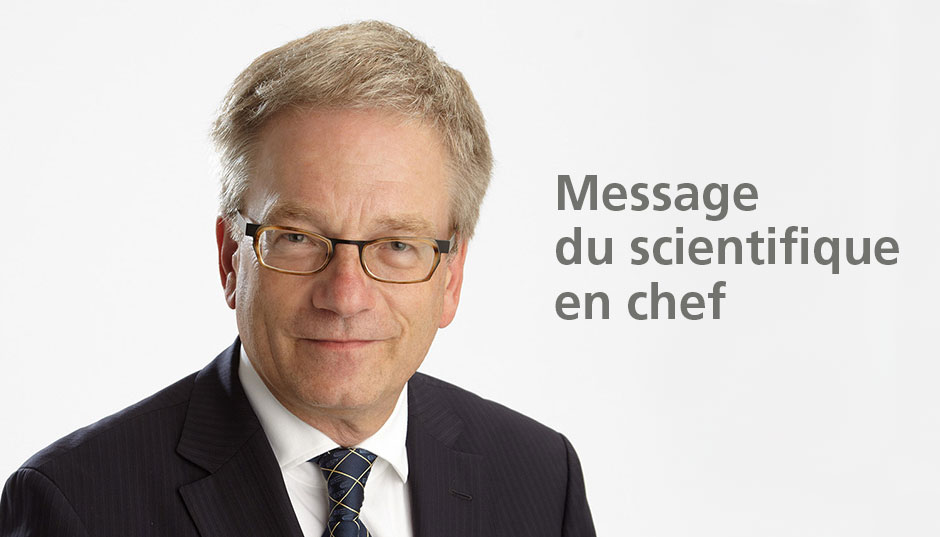Dear Members of the research community:
Best wishes to you and yours! I hope that 2014 brings health and happiness and perhaps even a few flights of fancy to brighten your life.
This past year was exceedingly eventful and entirely rewarding. Without a doubt, one of the highlights of 2013 was the launch of the National Research and Innovation Policy (NRIP) on October 16th by Minister Pierre Duchesne. The policy was developed after months of intense work that involved many members of the scientific community, our colleagues at the ministère de l’Enseignement supérieur, de la Recherche, de la Science et de la Technologie and in the minister’s office, and the administrators of the FRQ. We are proud of the NRIP, which was generally welcomed by stakeholder groups across Québec. Together, we will contribute to achieving the policy’s most ambitious goals since they concern actors from civil society, academia including universities, colleges, high schools and elementary schools, and the public, private and community sectors.
Here are a few key elements of the NRIP:
- It is the very first five-year scientific policy.
- In total, $3.7B will be invested.
- Strategies are focused on new researcher training, especially in science, mathematics and engineering.
- Three major social challenges were brought to light: demographic change, sustainable development (including transportation electrification) and Québec identity. An intersectoral approach will drive large-scale research projects on these themes as well as international and inter-professional partnerships.
- Seven priority niche areas were set out: aeronautics, bio-food, biotechnology, renewable energies and transportation electrification, creative industries, personalized health care and information technologies and communications.
- The core budgets of the three Fonds de recherche du Québec will be sustained in 2014 and increased by 25% as compared to 2012-2013.
- Research chairs in language and history will be created.
- Funds will support French-language publishing and access to government databases.
- Integrity, sound governance and ethics will guide research and innovation.
- Support will be provided to small and medium businesses through new measures to foster corporate research and innovation.
- To enhance the quality of life of our fellow citizens, strategies will foster exchanges and partnerships between academic, private sector and civil society stakeholders.
- Efforts will be invested to promote exchanges between government stakeholders and members of the scientific community.
- Strategies will promote scientific culture as early as elementary school and, in certain cases, in partnership with museums.
The Fonds de recherche du Québec will be involved in the deployment of the policy over the next five years since many measures directly or indirectly involve the agencies by virtue of their mission to support research, researcher training and knowledge mobilization. The first year of the policy, 2014-2015, is already in the planning stages. Despite the Fonds’ budget increase of 25%, certain choices must be made.
In fact, the 2014-2017 strategic plans of each Fonds were just recently adopted at the December meetings of the agencies’ boards of directors. Of course, the three-year programs account for the directions and priorities of the NRIP. The plans will be available online as soon as the minister and government approve them, as required by law. Certain sections will be updated as of 2014-2015.
International component
This fall, I was actively involved in a series of international initiatives. The first was held from October 4 to 11 in Japan, where I led a delegation from Québec that included university and government representatives and Maryse Lassonde, the scientific director of the Fonds Nature et Technologies. Several meetings with research groups and universities were held in Kyoto and Tokyo. Partnership opportunities were developed in the fields of gerontology and transportation and with the Riken research institute.
Also in October, I led a mission to Paris with the scientific directors of the Fonds de recherche to meet with representatives from key research institutions: the Conseil national de la recherche scientifique (CNRS) and its institutes, the Agence nationale de recherche (ANR), the Inserm and Instituts thématiques multi-organismes (ITMO), the ministère de l’Enseignement supérieur et de la Recherche et les Alliances, UNESCO, the Académie des sciences, the Commissariat général à l’investissement (Investissement d’Avenir), Électricité de France (EDF), the ministère des Affaires étrangères et européennes (MAEE) and the Cité des Sciences as well as with members of the Assemblée nationale and many others. The aim of the mission was to explore potential research development partnerships between France and Québec and establish and strengthen our relations with French organizations. Several projects are currently being discussed, including collaborations between the Inserm and the Fonds de recherche du Québec – Santé, which will both be celebrating 50-year anniversaries in 2014.
From November 14 to 16 in Paris, as part of Montréal International and along with representatives from Montréal universities, I presented Montréal’s bid for the secretariat of the international organization Future Earth, which aims to foster the research, knowledge development and innovation required by nations and their leaders to meet the challenges of sustainable development and climate change. Future Earth is supported by a board made up of representatives from international organizations, including the Belmont Forum and United Nations. Several cities around the world also expressed their interest. To be granted the secretariat would be particularly significant from the perspectives of international research development, strategic positioning and recognition for Québec and its researchers.
From November 22 to 26, I was invited by the International College of Neuropsychopharmacology to take part in a high-level meeting in Munich on the future of neuropharmacology and mental health. While in Germany, I met with Michel Côté, the delegate general at the Québec Government Office in Munich, and his colleagues. Mr. Côté and I met with representatives from several German funding agencies, including the senior directors of the Bavarian State Ministry for Education, Research and the Arts, the international directorate of the Fraunhofer and the administrators of several foundations. In fact, 2014 will mark 25 years of collaboration between Bavaria and Québec. Now is the time to further consolidate these ties through student exchange programs and major research and innovation projects, especially in the life sciences and transportation electrification sectors.
Finally, I have been working to organize a meeting with chief scientists from around the world as part of the Conference of Montréal in June 2014. Further details will follow.
With the launch of our new strategic directions and the NRIP, 2014 promises to be exciting and motivating. I’ll be counting on you next year!
Rémi Quirion, O.C., C.Q., PhD, FRSC
> See more messages to the community




